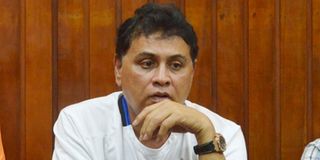Muhammad Asif: I’m suffering for refusing to help US drugs agency

Vijaygiri Goswami at the Mombasa Law Courts in December 2016. Mr Asif has claimed that Mr Goswami had tried to convince him to help entrap Mr Dawood Ibrahim who is wanted by the US.
Mr Muhammad Hafeez Asif, who is accused of supplying drugs to the Akasha brothers, now says his interaction with them wasn’t about drugs and that the United States is persecuting him for refusing to assist in an investigation.
In an exclusive interview with the Nation, Mr Asif, who is detained at Britain’s Belmarsh prison, said he interacted with the two Akasha brothers—Baktash Akasha Abdalla and Ibrahim Abdalla—when he visited Kenya in 1988.
The two Akasha brothers, Mamta Kulkarni, Ghulam Hussein, a Pakistan national, and Mr Vijayghiri (Vicky) Goswami, an Indian national, were arrested in 2017 by US agents and extradited to the US over their involvement in drugs.
According to Mr Asif, his elder brother was in the business of selling gold and silver with Mr Abdallah Ibrahim Akasha, father to the Akasha brothers.
“I visited Kenya in 1988 when my brother had a baby, that is when I first and last interacted with the Akasha brothers. Since then, I never had any interaction with them until Mr Goswami started raising allegations against me,” Mr Asif said. He added that his woes started when he held a series of meetings with officials from the Drug Enforcement Administration (DEA) who gave him juicy offers as they requested him for some help, which he refused.
“The US wanted me to work for them and play a key role in trapping Mr Dawood Ibrahim, a man I have known since the 1980s. They also wanted me to head to Mexico and pose as a fake drug lord and I turned down all these,” he told the Nation.
Mr Asif said that he had built a friendship with Mr Dawood in the 1980s when he used to go and watch cricket matches in Sharjah Stadium in Dubai.
According to Mr Asif, his differences with Mr Goswami arose after the latter was released from a jail in Dubai where he had been locked up over his involvement in drugs. He believed that it is Mr Asif who set him up.
“When Goswami got released from prison, he made a deal and wanted me dead,” Mr Asif said. A few weeks after the failed attempt on his life, Mr Asif said that he interacted with Mr Goswami who tried to convince him to help trap Mr Dawood, but he refused.
On October 16, 2003, the US Treasury Department announced that it had designated Mr Ibrahim as a Specially Designated Global Terrorist under Executive Order 13224. It accused Mr Dawood of working closely with Al-Qaeda to share smuggling routes and funding terror attacks in India with the aim of destabilising the government.
Mr Asif, who believes that Mr Goswami was on a revenge mission to land him in jail, said that the latter had already struck a deal with DEA agents.
Apart from Dawood case, Mr Asif said he believed that Mr Goswami was not up to any good because “when I learnt that he (Goswami) was making mandrax in Dubai, I reported the crime and he was jailed”.
In a statement seen by the Nation, Mr Asif’s family accused the British government of locking him up in very harsh conditions yet they were aware that he was ill.
“He has in the past been locked up from meeting with a team of his lawyers from Pakistan. The visit authorization procedure for his European lawyers is extremely slow, which undermines fundamental rights in terms of defence,” the statement read in part. It stated that he was allowed to meet with members of his family only once a month.
“These conditions contribute to the deterioration of Mr Asif’s mental health, beyond the difficulties inherent in the detention itself. Mr Asif is locked up 23 hours a day in disastrous conditions for a man of a certain age,” it added.
Mr Asif’s lawyer mid last week wrote to the Crown Prosecution Service stating that the main reason they had sought its help was to give the US a chance to withdraw the extradition case.
“We write this letter to provide the US Government with an opportunity to either withdraw their extradition request or, alternatively, to respond to our clients request for disclosure set out in this letter,” the letter reads.
Further, the advocate said that the US government should come out clear and explain whether Mr Asif was arrested as collateral damage after he refused to work with the DEA.





